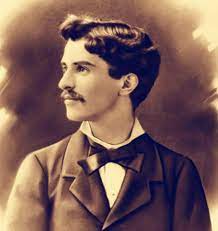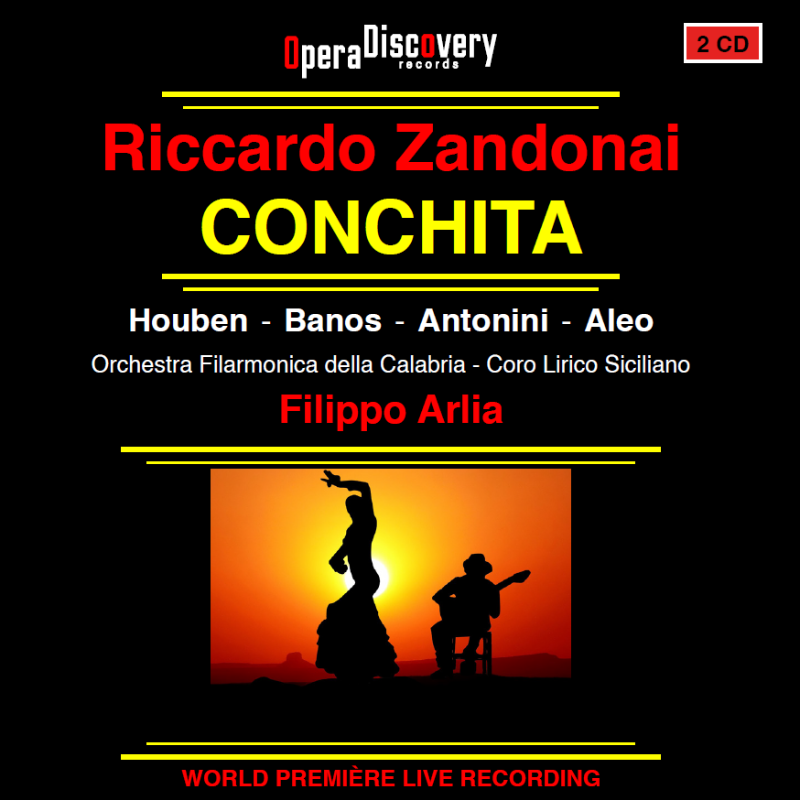Physical CD
€19,99
Tax included.
Shipping calculated at checkout.
Files in MP3 format
€9,99
Tax included.
Purchase includes the complete opera in MP3 format and the booklet files and Inlay Card sent to the indicated e-mail address.
Riccardo Zandonai

Riccardo Zandonai
Riccardo Zandonai was born in Borgo Sacco, near Rovereto, on 28 May, 1883. As a young man, he showed such an aptitude for music that he entered the Pesaro Conservatory in 1899 and completed his studies in 1902 in only three years. Among his teachers was Pietro Mascagni, who regarded him highly. During this period he composed the Inno degli studenti trentini, and Il ritorno di Odisseo. He wrote a number of operas: La coppa del re (1903), L’uccellino d’oro, (1907), Il grillo del focolare (1908), Conchita (1911), Melenis (1912), Francesca da Rimini (1914), La via della finestra (1919) Giulietta e Romeo (1922), I cavalieri di Ekebù (1925), Giuliano (1928), Una partita (1933), La farsa amorosa (1933), Il bacio (1954). He composed also symphonic music (Serenata medioevale, Quadri di Segantini), ballets (Biancaneve), chamber music (Primavera in val di sole, Trio serenata) and songs. In 1935 Zandonai became the director of the Rossini Conservatory in his beloved Pesaro. He died in Trebbianico, near Pesaro, on 5 June 1944.
Maurice Vaucaire

Maurice Vaucaire
Maurice Vaucaire was born in Versailles on July 2, 1863. He published eight collections of poetry, eighteen novels, had eighteen plays performed, and wrote ten librettos of operas or operettas, including Hans, le joueur de flûte by Louis Ganne and French translations of the librettos of Manon. Lescaut and La fanciulla del West by Giacomo Puccini. He died in Neuilly-sur-Seine on February 10, 1918.
Carlo Zangarini

Carlo Zangarini
Carlo Zangarini was born in Bologna on 9 December 1873. He was an Italian librettist, poet, and academic and is best remembered today for penning the librettos for La fanciulla del West (1910) by Giacomo Puccini, I gioielli della Madonna (1911) by Ermanno Wolf-Ferrari, and Conchita (1911) by Riccardo Zandonai. He also translated from French language into Italian the librettos of Médée by Luigi Cherubini (1797), and Pelléas et Mélisande by Claude Debussy (1902). He died in Bologna on 19 July 1943.
Conchita

Pierre Louys
The libretto by Maurizio Vaucaire and Carlo Zangarini is based on Pierre Louÿs’s 1898 novel La Femme et le pantin. The opera premièred in Milano at the Teatro dal Verme on 14 October 1911 with soprano Tarquinia Tarquini, who married Zandonai in 1917, in the title role and the famous tenor Piero Schiavazzi. The orchestra was conduced by Hector Panizza.

Teatro Dal Verme
The success was triumphant and prompted the editor Ricordi to suggest that Zandonai publish other works with him. Other performances of Conchita took place at the Royal Opera, London (1912), the Cort Theatre in San Francisco (1912), the Philharmonic Auditorium in Hollywood (1912), the Heilig Theatre in Portland (1912), the Metropolitan Opera House in Philadelphia (1912), the Chicago Grand Opera Company (1913), and the Teatro di San Carlo in Naples (1913) always starring Tarquini. Little by little the opera left the repertoires of theaters.
Synopsis

Hector Panizza, the first conductor of Conchita
The story takes place in Seville.
Conchita Pérez, a poor cigar maker, is wooed by Mateo, but she resists his advances. Mateo pays her mother some money to relieve their poverty. Offended, Conchita escapes and becomes a somewhat famous flamenco dancer. Mateo tracks her down and continues his advances as she resists them. To prove his love, she organizes a meeting with a fake lover in front of Mateo who becomes very irate as a result. She finally has proof of his love for her, which she now can reciprocate.

Piero Schiavazzi, the first Mateo

Tarquinia Tarquini, the first Conchita


